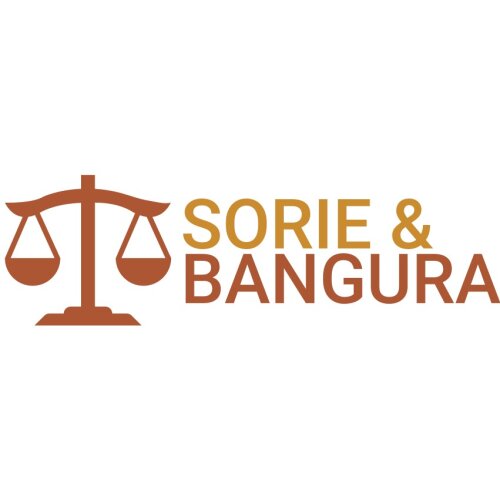Best Climate Change Law Lawyers in Sierra Leone
Share your needs with us, get contacted by law firms.
Free. Takes 2 min.
Or refine your search by selecting a city:
List of the best lawyers in Sierra Leone
About Climate Change Law in Sierra Leone
Climate Change Law in Sierra Leone focuses on the legal frameworks and policies aimed at addressing the impacts of climate change within the country. As global temperatures rise and environmental changes increase, Sierra Leone is taking steps to regulate emissions, promote renewable energy, preserve biodiversity, and enhance climate resilience. The law is evolving to reflect commitments under international agreements such as the Paris Agreement, and it shapes how businesses, communities, and government agencies manage the challenges and opportunities brought by climate change.
Why You May Need a Lawyer
You may require a lawyer with expertise in Climate Change Law in several situations. Common scenarios include disputes over land use or resource rights related to environmental protection, navigating complex regulations for renewable energy projects, resolving compliance issues with new climate-related legislation, and advocating for public health in the face of environmental hazards. Lawyers can also assist with claims for damages caused by climate impacts, represent communities affected by industrial pollution, and advise investors or companies on sustainable practices required by law.
Local Laws Overview
Sierra Leone’s efforts to address climate change are rooted in several key legal instruments. The country’s National Climate Change Policy and Strategy provides a framework for government action, including the reduction of greenhouse gas emissions and adaptation measures. The Environmental Protection Act gives the Environmental Protection Agency (EPA-SL) authority to regulate activities that affect the climate, such as deforestation, waste management, and pollution control. Sierra Leone is also committed to international treaties, including the United Nations Framework Convention on Climate Change, which requires the country to report on its actions and progress. Laws specific to climate-related investment, energy transition, and community rights are under continual development, reflecting the nation’s priorities and challenges.
Frequently Asked Questions
What is Climate Change Law?
Climate Change Law is a branch of environmental law that focuses on legal measures to fight climate change and its effects, covering everything from emissions limits to sustainable development.
Does Sierra Leone have laws specific to climate change?
Yes, Sierra Leone has adopted key policies and regulations such as the National Climate Change Policy and the Environmental Protection Act, which address climate change directly and guide related action.
Who enforces Climate Change Law in Sierra Leone?
The Environmental Protection Agency of Sierra Leone (EPA-SL) is the primary government body responsible for enforcing climate and environmental laws.
What are the penalties for companies that violate climate-related laws?
Penalties may include fines, suspension of operating licenses, remediation orders, or legal action, depending on the severity and nature of the violation.
Can communities affected by climate change take legal action?
Yes, affected communities can take legal action to seek remedies for environmental harm or to enforce rights under existing climate and environmental laws.
Are there incentives for using renewable energy in Sierra Leone?
The government encourages renewable energy projects and offers various incentives, including regulatory support, though the specific benefits may vary as policies develop.
How does Sierra Leone participate in international climate agreements?
Sierra Leone is a signatory to several international agreements such as the Paris Agreement, committing the country to reduce emissions and report on progress.
Is legal advice necessary for climate-related business projects?
Legal advice is highly recommended to ensure compliance with regulations, proper land acquisition, community engagement, and eligibility for incentives or funding.
What rights do individuals have if their land is affected by a climate mitigation project?
Individuals have rights to consultation, fair compensation, and legal recourse if their land or livelihoods are affected by projects implemented under climate change laws.
How can someone stay informed about changes in Climate Change Law?
Regularly reviewing updates from the Environmental Protection Agency, government publications, and consulting with legal professionals in the field are the best ways to stay informed.
Additional Resources
For those seeking more information or legal advice in Climate Change Law, consider the following resources:
- Environmental Protection Agency of Sierra Leone - the main regulatory authority for environmental and climate matters
- Ministry of the Environment - responsible for national climate policy and coordination
- Sierra Leone Bar Association - for referrals to lawyers with expertise in environmental and climate law
- Legal Aid Board Sierra Leone - offers support for individuals with limited resources
- Non-governmental organizations such as Green Scenery or the Conservation Society of Sierra Leone - engage in climate advocacy and legal literacy
- Community paralegals and local legal aid clinics can also provide guidance on climate change legal issues
Next Steps
If you need legal assistance in Climate Change Law, start by identifying the specific nature of your concern, such as regulatory compliance, land use, or environmental harm. Collect any relevant documents and information, then contact a qualified lawyer specializing in climate or environmental law. The Sierra Leone Bar Association or local legal aid offices can recommend trusted professionals. Engaging with the Environmental Protection Agency or climate advocacy groups can also provide helpful direction. Acting early and seeking professional advice ensures your rights are protected and that you comply with the nation’s climate laws and policies.
Lawzana helps you find the best lawyers and law firms in Sierra Leone through a curated and pre-screened list of qualified legal professionals. Our platform offers rankings and detailed profiles of attorneys and law firms, allowing you to compare based on practice areas, including Climate Change Law, experience, and client feedback.
Each profile includes a description of the firm's areas of practice, client reviews, team members and partners, year of establishment, spoken languages, office locations, contact information, social media presence, and any published articles or resources. Most firms on our platform speak English and are experienced in both local and international legal matters.
Get a quote from top-rated law firms in Sierra Leone — quickly, securely, and without unnecessary hassle.
Disclaimer:
The information provided on this page is for general informational purposes only and does not constitute legal advice. While we strive to ensure the accuracy and relevance of the content, legal information may change over time, and interpretations of the law can vary. You should always consult with a qualified legal professional for advice specific to your situation.
We disclaim all liability for actions taken or not taken based on the content of this page. If you believe any information is incorrect or outdated, please contact us, and we will review and update it where appropriate.
Browse climate change law law firms by city in Sierra Leone
Refine your search by selecting a city.












